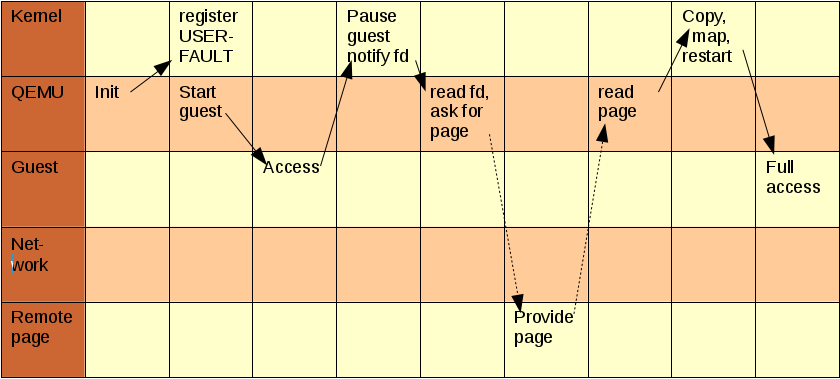Features/PostCopyLiveMigration: Difference between revisions
(→design) |
(→design) |
||
| Line 10: | Line 10: | ||
== design == | == design == | ||
This postcopy implementation uses the Linux 'userfault' and 'remap_anon_pages' kernel mechanisms from Andrea Arcangeli; it's not specific | This postcopy implementation uses the Linux 'userfault' and 'remap_anon_pages' kernel mechanisms from Andrea Arcangeli; it's not specific | ||
to Postcopy and is designed to allow use with all of the standard kernel features (like transparent huge pages, KSM etc). | to Postcopy and is designed to allow use with all of the standard kernel features (like transparent huge pages, KSM etc). | ||
| Line 17: | Line 15: | ||
Mixed pre/post copy is built into the design from the start; a command is sent to switch modes after the migration | Mixed pre/post copy is built into the design from the start; a command is sent to switch modes after the migration | ||
has been stated (as long as postcopy mode has been enabled first by a capability) | has been stated (as long as postcopy mode has been enabled first by a capability) | ||
[[File:postcopyflow.png]] | [[File:postcopyflow.png]] | ||
=== Major components === | === Major components === | ||
Where possible the design attempts to build reusable components that other features can reuse. | |||
* 'command' section type for sending migration commands that don't directly reflect guest state; this is used to send messages that move through different phases of postcopy and is expandable for use by others. | * 'command' section type for sending migration commands that don't directly reflect guest state; this is used to send messages that move through different phases of postcopy and is expandable for use by others. | ||
* 'return path' a method for the destination to send messages back to the source; used for postcopy page requests, and allows the destination to signal failure back to the source | * 'return path' a method for the destination to send messages back to the source; used for postcopy page requests, and allows the destination to signal failure back to the source; this is currently supported on TCP and fd (where the fd is socket backed). | ||
* 'sent map' a bitmap on the source populated with the set of all pages that have already been transmitted | * 'sent map' a bitmap on the source populated with the set of all pages that have already been transmitted | ||
* 'postcopy pagemap inbound (PMI)' a map on the destination holding the state of each page, whether it's been requested from the source and whether it has been received. | * 'postcopy pagemap inbound (PMI)' a map on the destination holding the state of each page, whether it's been requested from the source and whether it has been received. | ||
Revision as of 10:58, 30 September 2014
summary
post-copy based live migration
owner
- Name: Dave Gilbert
- Email: dgilbert@redhat.com
description
A postcopy implementation that allows migration of guests that have large page change rates (relative to the avialable bandwidth) to be migrated in a finite time.
design
This postcopy implementation uses the Linux 'userfault' and 'remap_anon_pages' kernel mechanisms from Andrea Arcangeli; it's not specific to Postcopy and is designed to allow use with all of the standard kernel features (like transparent huge pages, KSM etc).
Mixed pre/post copy is built into the design from the start; a command is sent to switch modes after the migration has been stated (as long as postcopy mode has been enabled first by a capability)
Major components
Where possible the design attempts to build reusable components that other features can reuse.
- 'command' section type for sending migration commands that don't directly reflect guest state; this is used to send messages that move through different phases of postcopy and is expandable for use by others.
- 'return path' a method for the destination to send messages back to the source; used for postcopy page requests, and allows the destination to signal failure back to the source; this is currently supported on TCP and fd (where the fd is socket backed).
- 'sent map' a bitmap on the source populated with the set of all pages that have already been transmitted
- 'postcopy pagemap inbound (PMI)' a map on the destination holding the state of each page, whether it's been requested from the source and whether it has been received.
TODO
future enhancement
- optimization - rate limit the background page transmission to reduce the impact on the latency of postcopy page requests.
- Integration with RDMA

